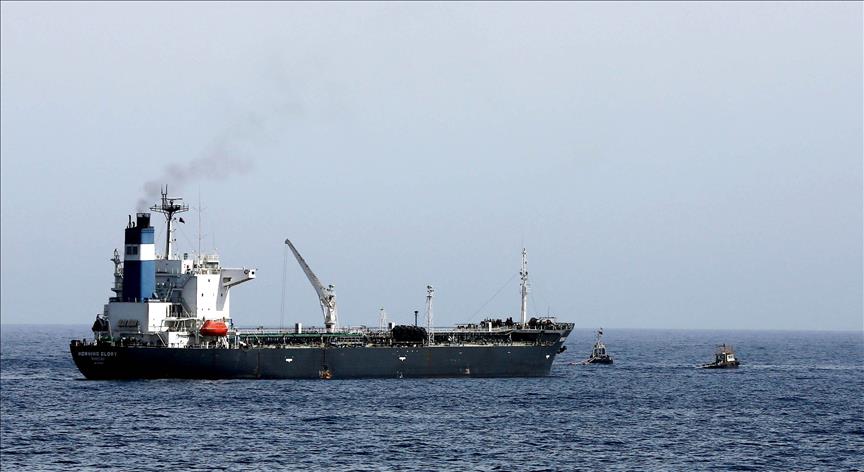
By Selen Tonkus
ANKARA
A tanker fueled with Kurdish oil is two days away from reaching a U.S. port, might signal a change in the U.S.' position towards Iraq, say experts.
A ship, the United Kalavrvt, loaded with oil from Iraqi Kurdistan which left the Turkish port of Ceyhan in June is just two days away from reaching Texas' Galveston port, despite U.S.' long standing position against Kurdish oil sales without Iraqi central government's consent.
Experts told Anadolu Agency this is a sign of a change in U.S.' position in favor of Iraqi Kurds.
The Islamic State in Iraq and Levant (ISIL) and its allies have splintered the Iraqi government's control of the country when they seized Iraq's second-largest city Mosul and its surrounding area on June 10. As they seized the Baiji refinery - the largest oil refinery in Iraq, Kurdish Regional Government (KRG) declared they built a link connecting Kirkuk to its newly-built pipeline to Turkey. The pipeline will enable the Kurds to export Kirkuk oil through their own network independently from Baghdad.
Iraq's federal government and the Kurdish Regional Government have long-standing disagreements over the agreement with Turkey to allow the sale of oil through Turkey to international markets, without going through Iraq's national oil regulator.
Northern Iraqi oil began shipment from Turkey's southern Ceyhan Port to international markets on May 22, prompting Baghdad to appeal for international arbitration against Turkey and demand the immediate halt to the oil trade.
Washington has expressed fears several times that independent oil sales from Northern Iraq's Kurdish region could contribute to the break-up of Iraq as the government in Baghdad struggles to contain Sunni Islamist insurgents that have captured vast swathes of the country.
David Romano from Missouri State University said, "I certainly think there is a reassessment going on in the U.S. It was evident yesterday in the Congressional Foreign Affairs Committee hearing on Iraq."
Romano explained a number of American congressmen questioned the State Department’s Brett McGurk, Deputy Assistant Secretary for Iraq and Iran, and the Department of Defense’s Elissa Slotkin about the fall of Mosul, Jihadi gains in Iraq, Prime Minister Maliki’s government and its failures, as well as the wisdom of insisting on the territorial integrity of a British-created state that appears perpetually dysfunctional.
Romano also mentioned that Congressman Duncan of South Carolina questioned the United States’ opposition to Kurdistan Regional Government oil exports, asking if taking such a position was wise given Kurdish friendliness to the United States.
Marina Ottaway from the Wilson Center, a leading institution for in-depth research, said it is not certain the ship is heading for Galveston as it may still go somewhere else while its position is two days away for the anticipated destination of Galveston port.
She suggested if it does go to Galveston, it means one of three things:
"The U.S. realizes it needs to support the Kurdistan Regional government and the peshmerga against the Islamic state, so it will not take even more territory; secondly, it has not changed its policy permanently, but is sending a warning to Maliki –see what we can do if you do not become more cooperative; or thirdly, an oil company, or more than one, are willing to defy the U.S. government to protect their interests."
Ottaway added, sooner or later U.S. policy will change, because the U.S. needs the Kurds to help stop ISIL.
"Too early to say change"
On the other hand, London based Energy Aspects expert Richard Mallinson said it is too early to tell whether it will actually dock there or if a U.S. buyer has been found for the crude onboard.
Mallinson noted that the ship may still change course or remain off the coast.
Mallinson emphasized the U.S. would prefer to see Baghdad and Erbil reach a compromise over oil exports and other disagreements.
"If the ship does unload in Texas, then the U.S. response will be watched closely to see how actively U.S. authorities help Baghdad to pursue legal claims," he added.
London based Carduchi energy consulting firm's head, Shwan Zulal also cautiously said it is too early to say the U.S. position has changed.
"But the fact the tanker is heading there without serious opposition is an indication the U.S.' position maybe softening due to the whole situation in Iraq and the dire finances of the KRG," he stated.
Anadolu Agency website contains only a portion of the news stories offered to subscribers in the AA News Broadcasting System (HAS), and in summarized form. Please contact us for subscription options.

